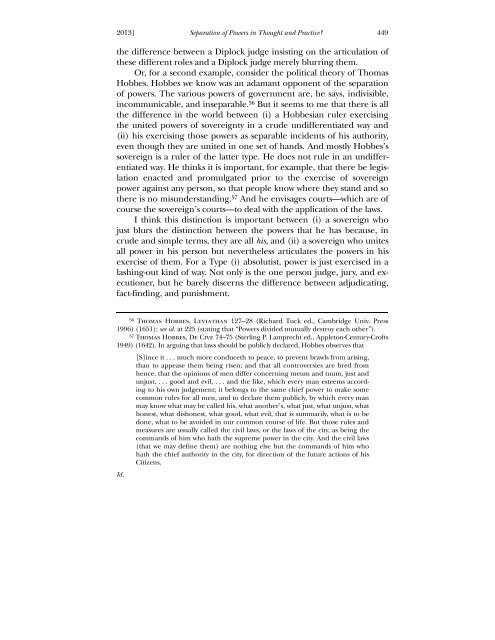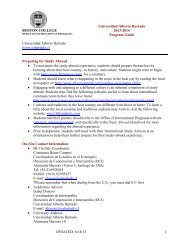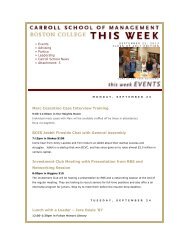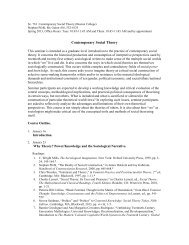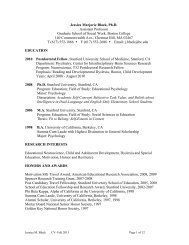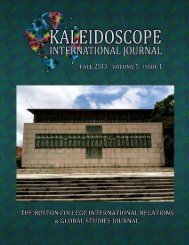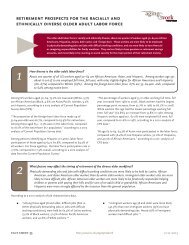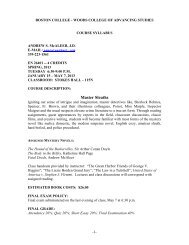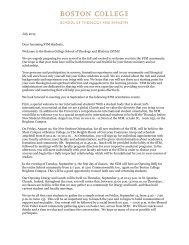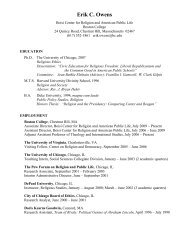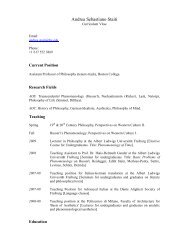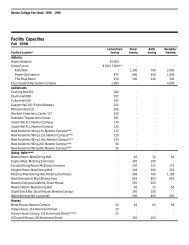separation of powers in thought and practice? - Boston College
separation of powers in thought and practice? - Boston College
separation of powers in thought and practice? - Boston College
You also want an ePaper? Increase the reach of your titles
YUMPU automatically turns print PDFs into web optimized ePapers that Google loves.
2013] Separation <strong>of</strong> Powers <strong>in</strong> Thought <strong>and</strong> Practice? 449<br />
the difference between a Diplock judge <strong>in</strong>sist<strong>in</strong>g on the articulation <strong>of</strong><br />
these different roles <strong>and</strong> a Diplock judge merely blurr<strong>in</strong>g them.<br />
Or, for a second example, consider the political theory <strong>of</strong> Thomas<br />
Hobbes. Hobbes we know was an adamant opponent <strong>of</strong> the <strong>separation</strong><br />
<strong>of</strong> <strong>powers</strong>. The various <strong>powers</strong> <strong>of</strong> government are, he says, <strong>in</strong>divisible,<br />
<strong>in</strong>communicable, <strong>and</strong> <strong>in</strong>separable.56 But it seems to me that there is all<br />
the difference <strong>in</strong> the world between (i) a Hobbesian ruler exercis<strong>in</strong>g<br />
the united <strong>powers</strong> <strong>of</strong> sovereignty <strong>in</strong> a crude undifferentiated way <strong>and</strong><br />
(ii) his exercis<strong>in</strong>g those <strong>powers</strong> as separable <strong>in</strong>cidents <strong>of</strong> his authority,<br />
even though they are united <strong>in</strong> one set <strong>of</strong> h<strong>and</strong>s. And mostly Hobbes’s<br />
sovereign is a ruler <strong>of</strong> the latter type. He does not rule <strong>in</strong> an undifferentiated<br />
way. He th<strong>in</strong>ks it is important, for example, that there be legislation<br />
enacted <strong>and</strong> promulgated prior to the exercise <strong>of</strong> sovereign<br />
power aga<strong>in</strong>st any person, so that people know where they st<strong>and</strong> <strong>and</strong> so<br />
there is no misunderst<strong>and</strong><strong>in</strong>g.57 And he envisages courts—which are <strong>of</strong><br />
course the sovereign’s courts—to deal with the application <strong>of</strong> the laws.<br />
I th<strong>in</strong>k this dist<strong>in</strong>ction is important between (i) a sovereign who<br />
just blurs the dist<strong>in</strong>ction between the <strong>powers</strong> that he has because, <strong>in</strong><br />
crude <strong>and</strong> simple terms, they are all his, <strong>and</strong> (ii) a sovereign who unites<br />
all power <strong>in</strong> his person but nevertheless articulates the <strong>powers</strong> <strong>in</strong> his<br />
exercise <strong>of</strong> them. For a Type (i) absolutist, power is just exercised <strong>in</strong> a<br />
lash<strong>in</strong>g-out k<strong>in</strong>d <strong>of</strong> way. Not only is the one person judge, jury, <strong>and</strong> executioner,<br />
but he barely discerns the difference between adjudicat<strong>in</strong>g,<br />
fact-f<strong>in</strong>d<strong>in</strong>g, <strong>and</strong> punishment.<br />
56 Thomas Hobbes, Leviathan 127–28 (Richard Tuck ed., Cambridge Univ. Press<br />
1996) (1651); see id. at 225 (stat<strong>in</strong>g that “Powers divided mutually destroy each other”).<br />
57 Thomas Hobbes, De Cive 74–75 (Sterl<strong>in</strong>g P. Lamprecht ed., Appleton-Century-Cr<strong>of</strong>ts<br />
1949) (1642). In argu<strong>in</strong>g that laws should be publicly declared, Hobbes observes that<br />
Id.<br />
[S]<strong>in</strong>ce it . . . much more conduceth to peace, to prevent brawls from aris<strong>in</strong>g,<br />
than to appease them be<strong>in</strong>g risen; <strong>and</strong> that all controversies are bred from<br />
hence, that the op<strong>in</strong>ions <strong>of</strong> men differ concern<strong>in</strong>g meum <strong>and</strong> tuum, just <strong>and</strong><br />
unjust, . . . good <strong>and</strong> evil, . . . <strong>and</strong> the like, which every man esteems accord<strong>in</strong>g<br />
to his own judgement; it belongs to the same chief power to make some<br />
common rules for all men, <strong>and</strong> to declare them publicly, by which every man<br />
may know what may be called his, what another’s, what just, what unjust, what<br />
honest, what dishonest, what good, what evil, that is summarily, what is to be<br />
done, what to be avoided <strong>in</strong> our common course <strong>of</strong> life. But those rules <strong>and</strong><br />
measures are usually called the civil laws, or the laws <strong>of</strong> the city, as be<strong>in</strong>g the<br />
comm<strong>and</strong>s <strong>of</strong> him who hath the supreme power <strong>in</strong> the city. And the civil laws<br />
(that we may def<strong>in</strong>e them) are noth<strong>in</strong>g else but the comm<strong>and</strong>s <strong>of</strong> him who<br />
hath the chief authority <strong>in</strong> the city, for direction <strong>of</strong> the future actions <strong>of</strong> his<br />
Citizens.


